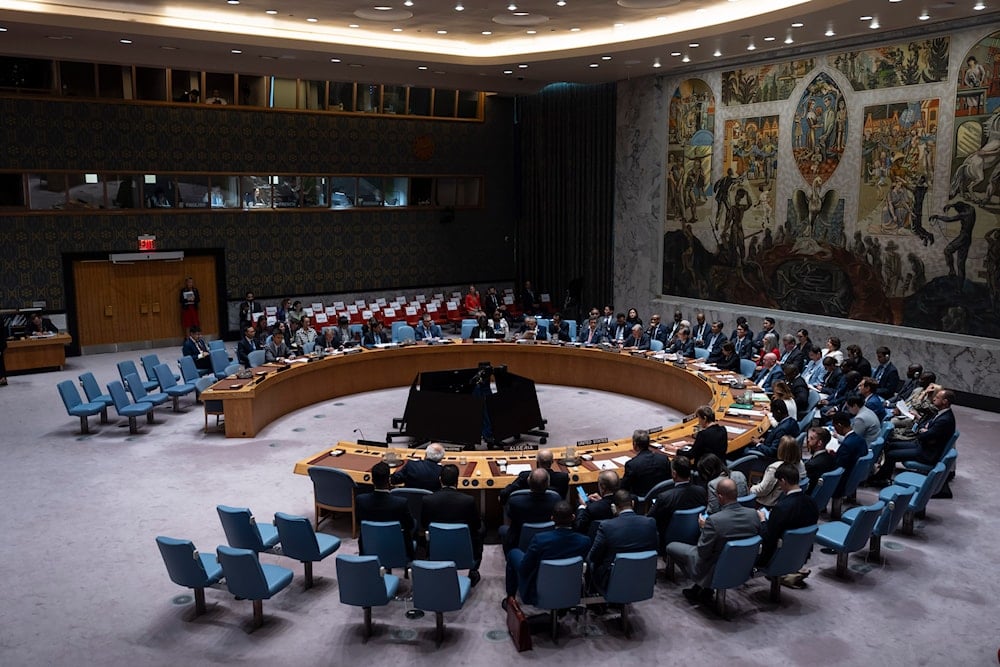Al-Dali: Hamas delegation expected in Cairo in few hours - Exclusive
A Hamas delegation led by Khalil al-Hayya heads to Cairo for talks on Palestinian unity and a response to the UN Gaza resolution.
-

A general view shows a Security Council meeting at the United Nations headquarters, Tuesday, Sept. 23, 2025, at UN headquarters (AP)
A high-level delegation from Hamas, headed by senior official Khalil al-Hayya, is expected to arrive in Cairo imminently for critical talks, Hani al-Dali, the expert on Palestinian Resistance affairs, revealed.
Speaking to Al Mayadeen, al-Dali stated that the visit by the group's top leadership is aimed at "coordinating stances with Arab nations and fortifying the Palestinian national position against Israeli schemes." He described the trip as "highly significant", indicating that Hamas attributes special importance to the meetings due to the "sensitivity of the current stage."
The analyst further noted that various Palestinian factions are set to participate in these "important national meetings," noting that there is ongoing "communication with the leadership of the Fatah movement and the Palestinian Authority" and highlighting a "sense of unity on the ground and a keenness for coordination."
Al-Dali expressed hope that the Palestinian Authority and Fatah's leadership would prioritize the supreme interests of the Palestinian people, stating that the "entirety of Palestine is the target."
US proposal aims to liquidate Palestinian cause: Al-Dali
The talks come in the wake of a recently approved UN Security Council resolution, drafted by the United States, which supports a plan for Gaza that includes deploying an international force and disarming Palestinian Resistance groups. The resolution passed with 13 votes in favor, while Russia and China abstained.
Al-Dali strongly criticized the resolution, asserting that its goal, along with the broader American proposal, is to "liquidate the Palestinian cause and the national project."
He argued that what is needed instead is a "national strategy to confront these schemes and provide relief for our people in the West Bank and Gaza," emphasizing that the Israeli occupation is "incapable of eliminating the Palestinian Resistance."
Echoing this sentiment, Hamas has publicly rejected the UN resolution, stating that it "falls short of the political and humanitarian rights of the Palestinian people, particularly in Gaza." The group condemned the measure as an attempt to "impose an international trusteeship over the sector" and achieve the occupation's objectives through a different means, following what it describes as two years of "failed genocidal war." Hamas reaffirmed the Palestinian people's unified rejection of the proposal.
UNSC adopts US proposal for Gaza
On November 17, 2025, the United Nations Security Council adopted Resolution 2803, drafted by the United States, which authorizes the deployment of an international stabilization force and a transitional governing body in the Gaza Strip.
The resolution builds on the ceasefire deal reached on October 10, 2025, and incorporates the so-called “20-point plan” led by the US. It outlines a multi-phase roadmap for Gaza, beginning with a full ceasefire and the deployment of an international stabilisation force to oversee security.
The plan calls for the complete demilitarization of Gaza, the disarmament of all Palestinian Resistance groups, and the dismantling of military infrastructure. It also mandates the establishment of a technocratic administrative body, referred to as the “Board of Peace,” tasked with managing humanitarian aid, coordinating reconstruction, and preparing for eventual elections under international supervision.
The draft was first circulated on November 3, 2025, then revised on November 10 and November 13, 2025, before the final vote. Delegations from Arab states sought stronger language on Palestinian self‑determination during the negotiations.
Reactions were divided: the resolution passed with 13 votes in favour, while Russia and China abstained. Hamas condemned the plan as an effort to impose an “international trusteeship” over Gaza and bypass Palestinian Resistance through diplomatic means, while describing the resolution as a continuation of the occupation’s objectives following what it called two years of a “failed genocidal war.”

 4 Min Read
4 Min Read











